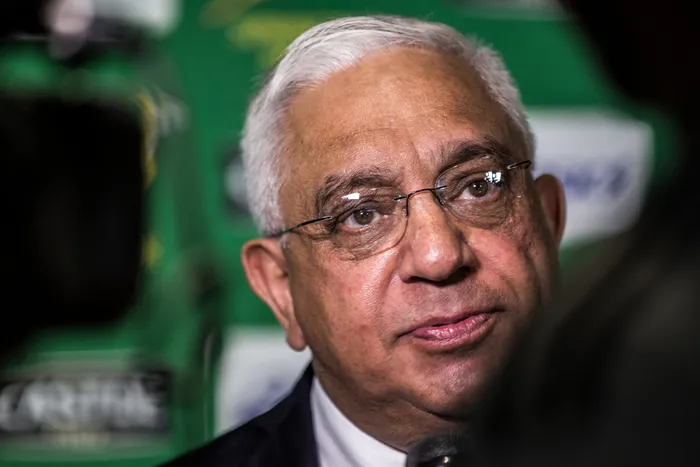Springbok equity deal put on ice as MPs demand debate on matter

Saru president Mark Alexander said the union had followed all protocols and the organisation had committed to briefing members, adding that it remained committed to transparency and accountability. Picture: AFP
Political parties have welcomed the decision by the South African Rugby Union (Saru) to postpone a vote on a proposal to conclude a private equity investment in the country’s rugby commercial rights, saying greater debate was needed when it involved a “national asset”.
Saru which manages the national Springboks team, planned to sell a 20% stake in a newly created commercial-rights company for $75 million (R1.3 billion) to American-based Ackerley Sports Group LLC.
The deal is meant to capitalise on the success of the Springboks who have won back-to-back Rugby World Cups and is reported to be similar to a deal given to the New Zealand’s All Blacks, to raise funds from private equity.
Seven of Saru’s 14 provincial unions have opposed the deal and member unions were due to vote at a special general meeting yesterday but this was postponed after Sport, Arts and Culture minister Gayton McKenzie requested a delay to review information on it.
Saru president Mark Alexander said the union had followed all protocols and the organisation had committed to briefing members, adding that it remained committed to transparency and accountability.
“We believe our organisation has a long-standing track record for good governance and responsible management, as well as nation-building representative teams,” Alexander said.
The DA’s Joe McGluwa, chairperson of the Sport, Arts and Culture’s portfolio committee said the discussions to acquire Saru’s commercial rights was a deal of such magnitude that it should be thoroughly considered as the Springboks should be seen as a national asset.
“Because of this we all have an interest in their fate and the deal should be completely transparent and South Africans deserve to be fully informed.”
McGluwa said Saru was expected to appear before the committee where it will be expected to explain the deal.
“The right deal could be of great benefit, but the deal must be right. The stake cannot just be sold to an international company without proper consultation, South Africans are key stakeholders, rich and poor.
“The contract conditions of the equity stake must be studied by an independent body to ensure that no individual is going to enrich him or herself at the expense of the entire country,” McGluwa said.
Build One South Africa Movement (Bosa) leader Mmusi Maimane said the transaction should not mean that viewing the Springboks play is inaccessible to most South Africans.
“My view, without understanding all the intricacies, is that the national rugby team belongs to South Africans.
“If the transaction renders them inaccessible to the people, then it is something that we cannot accept as the people of this country because its net effect will mean that, in essence, you could partly privatise rugby at the expense of the South African public.”
UDM leader Bantu Holomisa said the Springboks team was a source of national pride “that cannot just be signed away with a cheque”.
“Such a decision cannot be taken by executives of a company, there needs to be a national debate because the team is the pride of the nation.
“We need transparency and it cannot be used as a money-making initiative for the private sector,” Holomisa said.
Tshepo Matseba, managing director of the Reputation 1st Group said at face value, the proposed deal for South African Rugby to go into an equity deal appeared to “reinforce a positive message that the Springboks as a brand has gained significant equity globally, thus attracting an investment by an international group of investors”.
“The true test of the fairness and commercial viability of the proposed private equity deal is whether the process to identify prospective equity partners was transparent and open to all role-players.
“Importantly, given the Springboks’ brand equity and reputation, supported by a solid track record, questions have to be asked about the value that the private equity partners are willing to invest for the 20%.”
Matseba said it was reasonable for other partners within the country’s rugby fraternity to raise these questions.
He said the key lesson for Saru in the process was to manage all stakeholders proactively by developing a succinct communication strategy that enabled the organisation to articulate the proposition fully.
“Simply making strategic decisions on votes is probably detrimental to what could be a potentially viable proposition for Saru that would help elevate the sport and strengthen the Springboks brand globally.
“Transparency and open communication in a consultative fashion across all stakeholders is key.”
Brand and reputation expert Solly Moeng, who has recently joined ActionSA, said the postponement of the decision made sense as this would prevent disputes at a later stage.
“The country has a broader interest in the ownership of the Springboks and you do not want a situation where part of a brand was given away in perpetuity, for a penny.”
The Mercury
Related Topics: